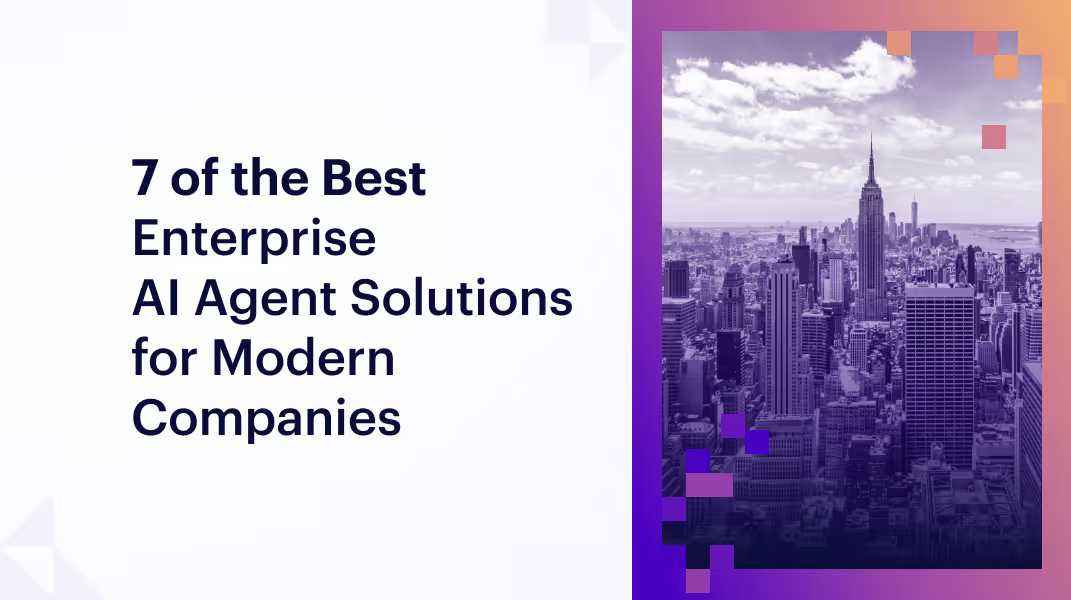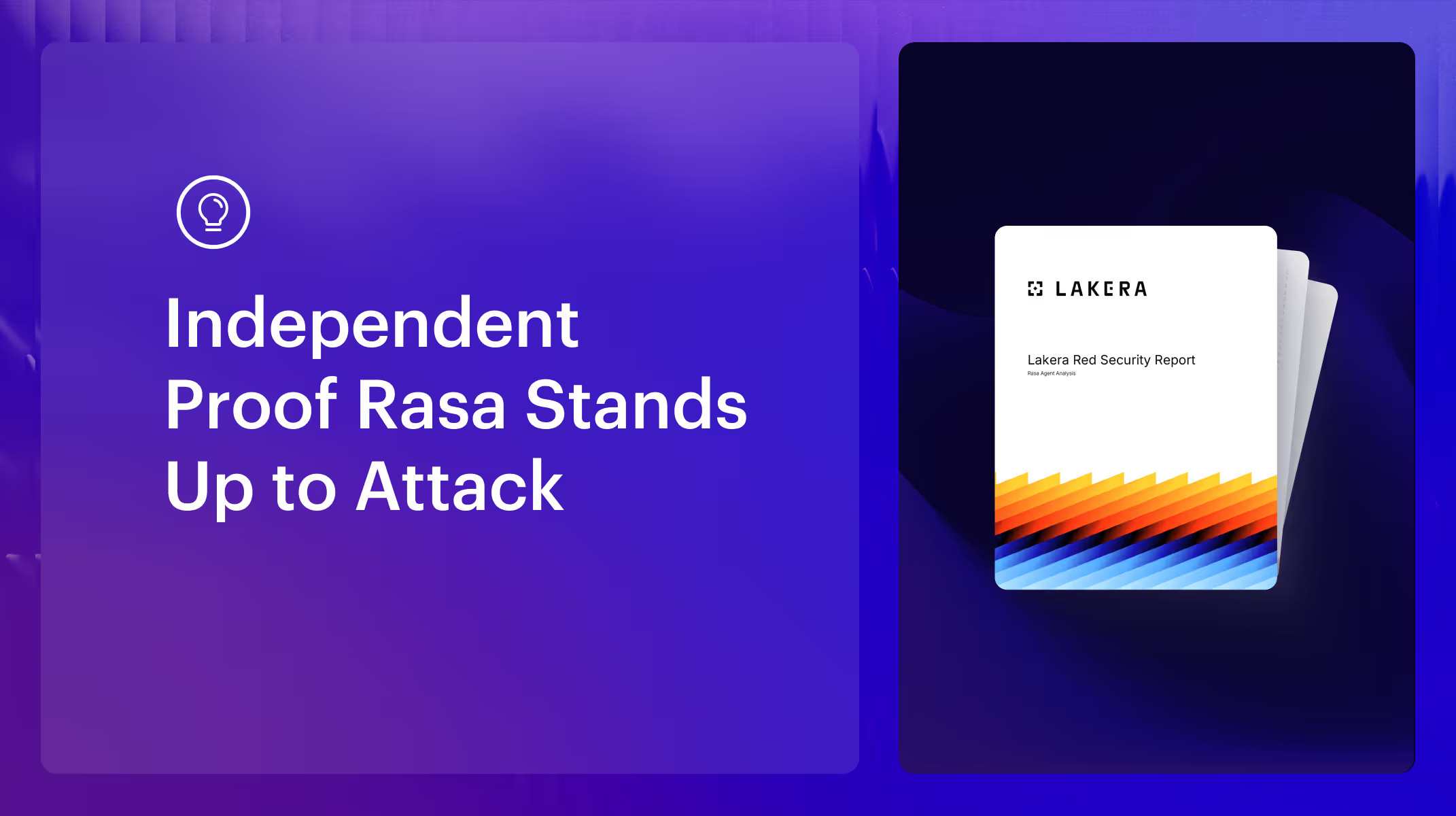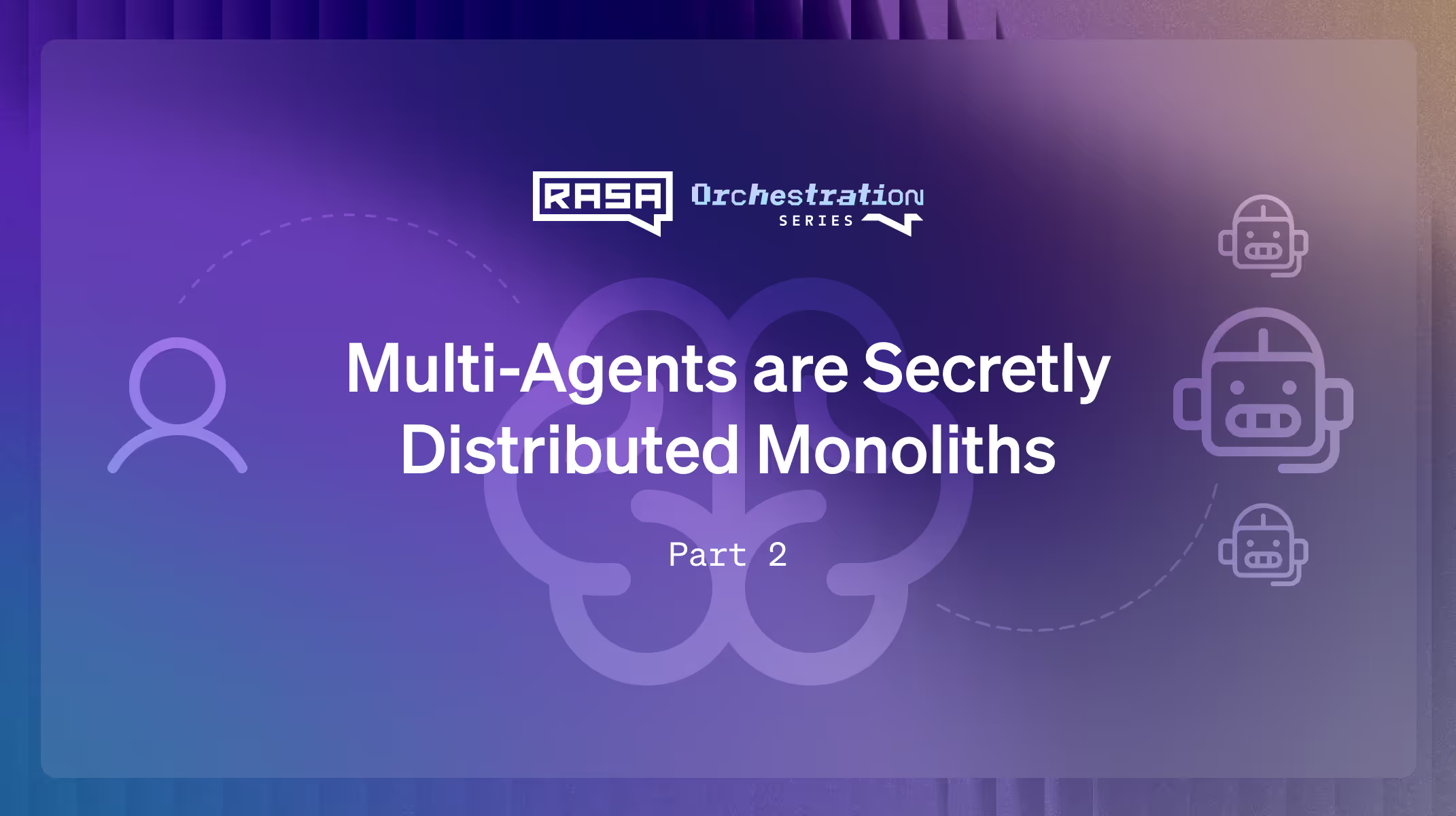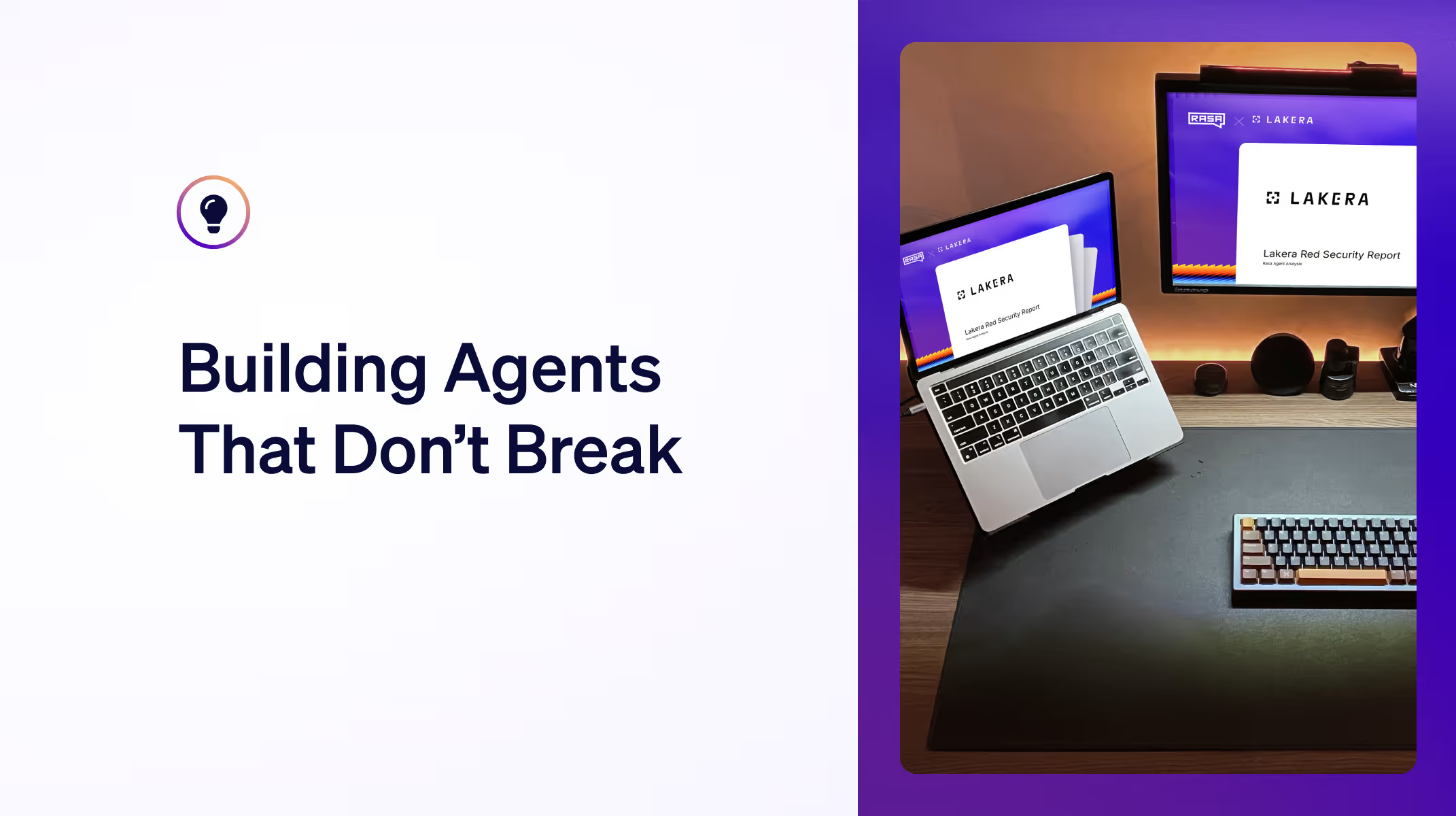Choosing the right AI solution shouldn't feel like a guessing game, yet many enterprise teams face that challenge. With dozens of vendors promising intelligent automation, it’s easy to get overwhelmed and harder to tell which platforms can deliver at scale. What most leaders want isn’t another black-box chatbot. They’re looking for reliable, customizable AI systems to handle business complexity, improve operational efficiency, and deliver measurable ROI.
Enterprise AI providers fill that gap. These systems go beyond basic task automation to understand context, manage multi-turn conversations, and integrate seamlessly with your existing tech stack. When built well, they streamline workflows, reduce manual effort, and give teams the confidence to scale AI across business units.
In this blog, we’ll explain enterprise AI agents, how they work, and which seven solutions stand out for companies ready to go from proofs of concept and into production.
What Are Enterprise AI Agents?
Enterprise artificial intelligence (AI) agents are intelligent systems designed to interpret language, make decisions, and take action based on business logic. Unlike basic bots that follow rigid scripts, AI agents can adapt to context, recover from ambiguity, and manage complex workflows across multiple systems. Many platforms use natural language understanding (NLU) and machine learning (ML) to interact with users more fluidly and execute tasks more accurately.
Their primary role is automating high-volume, repetitive interactions, freeing human teams to focus on more strategic work. Whether routing support tickets, updating account information, or guiding users through a product return, AI technologies help organizations operate more efficiently while improving customer interactions.
For large-scale enterprises, these systems are essential because they:
- Scale assistants across channels and markets using shared logic and modular conversation flows.
- Automate high-volume interactions like order updates, appointment scheduling, and account changes without sacrificing accuracy.
- Improve service quality with 24/7 support that understands user intent and adapts in real-time.
- Connect directly to CRMs, ticketing systems, and internal APIs to complete tasks during the conversation.
- Support multilingual, multi-domain assistants within a single framework, reducing overhead and maintaining consistency.
As enterprises grow, so do their business processes. Conversational AI platforms help manage that complexity while ensuring consistent, high-quality interactions at scale.
How Do Enterprise AI Agents Work?
Enterprise AI agents operate through language understanding, structured execution, and adaptive learning. They rely on technologies like natural language processing (NLP), machine learning (ML), and large language models (LLMs), but the real value comes from how these components interact within a structured system.
- NLP transforms raw user input into structured meaning. In hybrid systems, it’s often used alongside LLMs to handle intent recognition, entity extraction, and context tracking to help the assistant stay aligned with business logic.
- ML supports continual improvement. By learning from past interactions, machine learning helps agents personalize responses, fine-tune dialogue strategies, and reduce repeated errors, especially in open-ended or long-running conversations.
- LLMs bring linguistic fluency and adaptability. They help interpret nuanced language and handle variations in phrasing, but by themselves, LLMs often lack consistency. Without guardrails, they can misinterpret inputs, introduce errors, or take actions that deviate from business logic.
This is where Rasa’s CALM (Conversational AI with Language Models) architecture stands out. CALM uses an LLM for dialogue understanding (not for generating responses directly). The assistant interprets user input in context and maps it to structured commands that follow predefined flows. These flows reflect your business logic, so every response stays consistent, predictable, and easy to maintain.
CALM integrates with existing NLU tools and supports lightweight, fine-tuned models. This makes it easier to scale across use cases without sacrificing performance or driving up costs. Key benefits include:
- Separation of reasoning from execution, which improves control and reliability.
- Faster debugging when issues arise.
- Lower response times even for complex conversations.
- Consistent, predictable behavior in production.
This structured approach creates an enterprise AI agent that can adapt to new inputs and business goals while delivering large-scale, high-reliability automation.
Top 7 Enterprise AI Agent Solutions to Consider
Choosing the right AI agent platform is a strategic decision. Each solution on this list brings different strengths: some excel in out-of-the-box deployment, while others focus on control, customization, or vertical specialization. The right choice depends on your goals, infrastructure, and how much flexibility your teams need to scale effectively.
1. Rasa
Rasa is a purpose-built platform for building enterprise-grade AI assistants that balance flexibility, reliability, and control. Our core architecture, CALM, separates language understanding from task execution, giving teams consistent, interpretable, and debuggable automation. This structure allows language models to power fluent interactions without taking over business logic.
What sets Rasa apart:
- LLM-agnostic with built-in control: Use any model to keep outputs consistent with the CALM architecture, separating language understanding from execution.
- Conversation patterns: Built-in capabilities for topic switches, clarifications, and user corrections keep conversations on track without needing fragile intent trees.
- Pro-code and no-code tools: Rasa Studio supports non-technical teams with a no-code UI, while developers can customize, extend, and debug with our pro-code engine.
- Efficient and scalable: Fine-tuned small models like Llama 8B reduce latency and inference costs without sacrificing fluency.
- Full control over data and deployment: On-premise and cloud options give enterprises full autonomy over how and where assistants operate.
Rasa is ideal for enterprises that want scalable AI assistants with real business logic and need full control over data, integrations, and cost structure.
Connect with Rasa to explore how our customizable platform meets your unique needs.
2. Yellow.ai
Yellow.ai offers a unified platform for conversational AI and automation, focusing on customer support and employee experience optimization. Its platform includes prebuilt templates, multilingual support, and integrations with popular enterprise tools. Yellow.ai also supports both voice and text channels, aiming to simplify omnichannel deployment.
Best for: Enterprises looking for quick deployment across CX and EX use cases with less need for deep customization.
3. AiseraGPT
AiseraGPT is positioned as a generative AI solution for IT and customer experience automation. It combines conversational AI with enterprise knowledge graphs and domain-specific LLMs. Aisera emphasizes zero-shot learning and out-of-the-box support for common service workflows, helping teams automate without building flows from scratch.
Best for: IT service desks and support teams seeking a plug-and-play AI solution with minimal setup.
4. IBM Watsonx
IBM Watsonx is a single platform that integrates foundation models, data governance, and traditional machine learning. Known for its strength in regulated industries, Watsonx offers robust governance tools, data lineage tracking, and integration with IBM’s broader AI and cloud ecosystem.
Best for: Enterprises in finance, healthcare, or government that require extensive auditing, compliance, and model transparency.
5. Cognigy
Cognigy focuses on contact center automation, integrating deep into platforms like Genesys, Avaya, and Amazon Connect. Its platform supports multi-turn conversations, voice bots, and automation across channels. Cognigy’s strength lies in its visual flow builder and enterprise-grade scalability for voice-first experiences.
Best for: Teams modernizing their contact center operations with voice and text AI capabilities.
6. OneReach.ai
OneReach.ai offers a flexible platform emphasizing low-code/no-code development and dynamic process automation. It supports AI agents across text, voice, and IoT channels. The platform includes orchestration capabilities and features like intentless design to reduce reliance on intent classification.
Best for: Organizations experimenting with multi-modal automation or looking to design agentic systems across multiple interaction types.
7. Kore.ai
Kore.ai provides gen AI virtual assistant tools for customer service, HR, and IT. It includes an AI-powered development studio, voice integration, analytics, and vertical-specific templates. Kore.ai focuses on reducing development time with prebuilt capabilities while offering options for deeper customization when needed.
Best for: Enterprises that want a mix of prebuilt use cases and customization across departments like HR, CX, and IT.
What Makes Rasa the Right Choice for Enterprise AI
Finding the right AI solution means looking beyond surface-level features. It’s about choosing a platform that fits your technical requirements today while giving your team the flexibility to adapt as needs evolve. Rasa gives you that foundation with control, transparency, and the ability to customize every layer of the assistant experience.
Get in touch today to learn how Rasa’s platform supports real-world complexity without adding friction.
Customization and Flexibility
Rasa lets enterprises build AI agents that match how their teams work, not vice versa. Whether automating backend processes, connecting to third-party APIs, or managing conversations across multiple platforms, Rasa gives you complete control over behavior and structure.
- Use your own models or plug into any major LLM, including open-source options.
- Design flows that reflect real business logic and modify them as things change.
- Integrate cleanly with your existing stack, no major rewrites required.
Regulatory Compliance
Data control isn't optional in finance, healthcare, government, and other highly regulated sectors. Rasa supports on-premises deployment, so your team can meet internal policies without handing sensitive information to third-party APIs.
- Keep full ownership of your data pipelines and storage.
- Maintain compliance with industry standards like HIPAA, GDPR, and SOC 2.
- Audit every step of the assistant’s behavior for full transparency.
Advanced Conversational Capabilities
Rasa was built to support enterprise use cases, from transactional flows like order changes and account updates to retrieval-augmented experiences that provide dynamic, context-aware answers. Whether the assistant completes a task or references external knowledge, Rasa gives teams the tools to manage complexity without giving up control.
Our platform enables agentic behavior, allowing assistants to lead the conversation when needed. That means they can ask clarifying questions, suggest the next steps, and adapt the dialogue based on what’s happening in real time without relying on rigid scripts.
- Conversation repair keeps flows on track when users switch topics or rephrase.
- LLM-agnostic architecture lets you fine-tune language handling while preserving predictable outcomes.
- Rephrasers and contextual tools help the assistant respond naturally across repeated interactions.
- Flow patterns detect and manage clarifications, corrections, and unexpected turns.
- Structured control over actions and API calls makes it easier to guide users through complex procedures.
- Developers and designers can test and refine behavior using built-in debugging and simulation tools.
Rasa delivers agentic AI that actively guides users while staying grounded in your business logic. This gives enterprises a smarter, more resilient assistant that adapts as conversations unfold.
Support for Voice Automation
Many enterprises rely on voice as a primary channel, especially in contact centers where customers expect fast, direct support. Choose a platform that treats voice as a core capability, not an add-on.
Rasa offers a voice-ready solution for IVR use cases, making it easy to deploy assistants handling phone interactions, personalizing responses, and handing off to agents with full context. With built-in connectors and partner integrations, Rasa lets you extend automation to voice without giving up flexibility or control.
Unlock the Potential of Enterprise AI with Rasa
Enterprise AI agents help teams scale automation, improve service quality, and streamline complex operations. But to succeed in production, those agents must be flexible, reliable, and built to handle real-world demands.
Rasa brings that balance. With a framework that separates understanding from execution, supports any LLM, and adapts to enterprise systems, we give teams full control over how their assistants behave without compromising speed or accuracy.
Whether you're managing high-volume support, automating internal workflows, or building global experiences, Rasa provides the structure and flexibility to do it right.
Connect with us today to explore how Rasa helps enterprises deploy smarter AI agents at scale.






